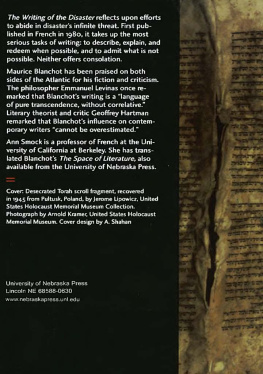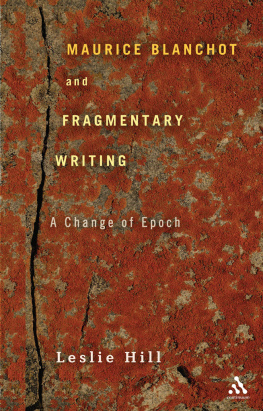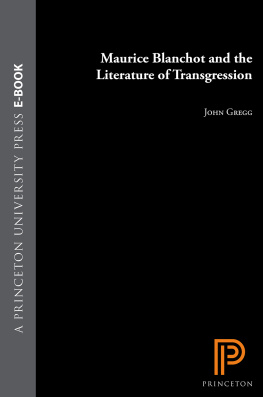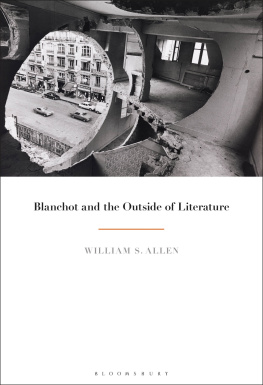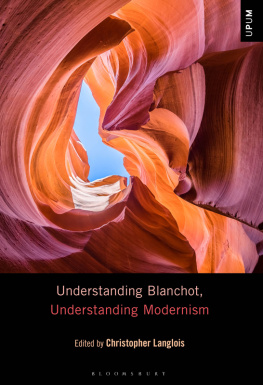Maurice Blanchot - Thomas the Obscure
Here you can read online Maurice Blanchot - Thomas the Obscure full text of the book (entire story) in english for free. Download pdf and epub, get meaning, cover and reviews about this ebook. year: 1995, publisher: Station Hill Pr, genre: Art. Description of the work, (preface) as well as reviews are available. Best literature library LitArk.com created for fans of good reading and offers a wide selection of genres:
Romance novel
Science fiction
Adventure
Detective
Science
History
Home and family
Prose
Art
Politics
Computer
Non-fiction
Religion
Business
Children
Humor
Choose a favorite category and find really read worthwhile books. Enjoy immersion in the world of imagination, feel the emotions of the characters or learn something new for yourself, make an fascinating discovery.

- Book:Thomas the Obscure
- Author:
- Publisher:Station Hill Pr
- Genre:
- Year:1995
- Rating:3 / 5
- Favourites:Add to favourites
- Your mark:
- 60
- 1
- 2
- 3
- 4
- 5
Thomas the Obscure: summary, description and annotation
We offer to read an annotation, description, summary or preface (depends on what the author of the book "Thomas the Obscure" wrote himself). If you haven't found the necessary information about the book — write in the comments, we will try to find it.
Thomas the Obscure — read online for free the complete book (whole text) full work
Below is the text of the book, divided by pages. System saving the place of the last page read, allows you to conveniently read the book "Thomas the Obscure" online for free, without having to search again every time where you left off. Put a bookmark, and you can go to the page where you finished reading at any time.
Font size:
Interval:
Bookmark:
Maurice Blanchot
(new version)
T HOMAS THE O BSCURE
tr. by Robert Lamberton
C ONTENTS
There is, for every work, an infinity of possible variants. The present version adds nothing to the pages entitled Thomas the Obscure begun in 1932, delivered to the publisher in May of 1940 and published in 1941, but as it subtracts a good deal from them, it may be said to be another, and even an entirely new version, but identical at the same time, if one is right in making no distinction between the figure and that which is, or believes itself to be, its center, whenever the complete figure itself expresses no more than the search for an imagined center.
I
T HOMAS SAT DOWN and looked at the sea. He remained motionless for a time, as if he had come there to follow the movements of the other swimmers and, although the fog prevented him from seeing very far, he stayed there, obstinately, his eyes fixed on the bodies floating with difficulty. Then, when a more powerful wave reached him, he went down onto the sloping sand and slipped among the currents, which quickly immersed him. The sea was calm, and Thomas was in the habit of swimming for long periods without tiring. But today he had chosen a new route. The fog hid the shore. A cloud had come down upon the sea and the surface was lost in a glow which seemed the only truly real thing. Currents shook him, though without giving him the feeling of being in the midst of the waves and of rolling in familiar elements. The conviction that there was, in fact, no water at all made even his effort to swim into a frivolous exercise from which he drew nothing but discouragement. Perhaps he should only have had to get control of himself to drive away such thoughts, but his eye found nothing to cling to, and it seemed to him that he was staring into the void with the intention of finding help there. It was then that the sea, driven by the wind, broke loose. The storm tossed it, scattered it into inaccessible regions; the squalls turned the sky upside down and, at the same time, there reigned a silence and a calm which gave the impression that everything was already destroyed. Thomas sought to free himself from the insipid flood which was invading him. A piercing cold paralyzed his arms. The water swirled in whirlpools. Was it actually water? One moment the foam leapt before his eyes in whitish flakes, the next the absence of water took hold of his body and drew it along violently. His breathing became slower; for a few moments he held in his mouth the liquid which the squalls drove against his head: a tepid sweetness, strange brew of a man deprived of the sense of taste. Then, whether from fatigue or for an unknown reason, his limbs gave him the same sense of foreignness as the water in which they were tossed. This feeling seemed almost pleasant at first. As he swam, he pursued a sort of revery in which he confused himself with the sea. The intoxication of leaving himself, of slipping into the void, of dispersing himself in the thought of water, made him forget every discomfort. And even when this ideal sea which he was becoming ever more intimately had in turn become the real sea, in which he was virtually drowned, he was not moved as he should have been: of course, there was something intolerable about swimming this way, aimlessly, with a body which was of no use to him beyond thinking that he was swimming, but he also experienced a sense of relief, as if he had finally discovered the key to the situation, and, as far as he was concerned, it all came down to continuing his endless journey, with an absence of organism in an absence of sea. The illusion did not last. He was forced to roll from one side to the other, like a boat adrift, in the water which gave him a body to swim. What escape was there? To struggle in order not to be carried away by the wave which was his arm? To go under? To drown himself bitterly in himself? That would surely have been the moment to stop, but a hope remained; he went on swimming as if, deep within the restored core of his being, he had discovered a new possibility. He swam, a monster without fins. Under the giant microscope, he turned himself into an enterprising mass of cilia and vibrations. The temptation took on an entirely bizarre character when he sought to slip from the drop of water into a region which was vague and yet infinitely precise, a sort of holy place, so perfectly suited to him that it was enough for him to be there, to be; it was like an imaginary hollow which he entered because, before he was there, his imprint was there already. And so he made a last effort to fit completely inside. It was easy; he encountered no obstacles; he rejoined himself; he blended with himself, entering into this place which no one else could penetrate.
At last he had to come back. He found his way easily and his feet touched bottom at a place which some of the swimmers used for diving. The fatigue was gone. He still had a humming in his ears and a burning in his eyes, as might be expected after staying too long in the salt water. He became conscious of this as, turning toward the infinite sheet of water reflecting the sun, he tried to tell in which direction he had gone. At that point, there was a real mist before his sight, and he could pick out absolutely anything in this murky void which his gaze penetrated feverishly. Peering out, he discovered a man who was swimming far off, nearly lost below the horizon. At such a distance, the swimmer was always escaping him. He would see him, then lose sight of him, though he had the feeling that he was following his every move: not only perceiving him clearly all the time, but being brought near him in a completely intimate way, such that no other sort of contact could have brought him closer. He stayed a long time, watching and waiting. There was in this contemplation something painful which resembled the manifestation of an excessive freedom, a freedom obtained by breaking every bond. His face clouded over and took on an unusual expression.
II
H E NEVERTHELESS DECIDED to turn his back to the sea and entered a small woods where he lay down after taking a few steps. The day was about to end; scarcely any light remained, but it was still possible to see certain details of the landscape fairly clearly, in particular the hill which limited the horizon and which was glowing, unconcerned and free. What was disturbing to Thomas was the fact that he was lying there in the grass with the desire to remain there for a long time, although this position was forbidden to him. As night was falling he tried to get up, and, pushing against the ground with both hands, got one knee under him while the other leg dangled; then he made a sudden lurch and succeeded in placing himself entirely erect. So he was standing. As a matter of fact, there was an indecision in his way of being which cast doubt on what he was doing. And so, although his eyes were shut, it did not seem that he had given up seeing in the darkness, rather the contrary. Likewise, when he began to walk, one might have thought that it was not his legs, but rather his desire not to walk which pushed him forward. He went down into a sort of vault which at first he had believed to be rather large, but which very soon seemed to him extremely cramped: in front, in back, overhead, wherever he put out his hands, he collided brutally with a surface as hard as a stone wall; on all sides his way was barred, an insurmountable wall all around, and this wall was not the greatest obstacle for he had also to reckon on his will which was fiercely determined to let him sleep there in a passivity exactly like death. This was insane; in his uncertainty, feeling out the limits of the vaulted pit, he placed his body right up against the wall and waited. What dominated him was the sense of being pushed forward by his refusal to advance. So he was not very surprised, so clearly did his anxiety allow him to see into the future, when, a little later, he saw himself carried a few steps further along. A few steps: it was unbelievable. His progress was undoubtedly more apparent than real, for this new spot was indistinguishable from the last, he encountered the same difficulties here, and it was in a sense the same place that he was moving away from out of terror of leaving it. At that moment, Thomas had the rashness to look around himself The night was more somber and more painful than he could have expected. The darkness immersed everything; there was no hope of passing through its shadows, but one penetrated its reality in a relationship of overwhelming intimacy. His first observation was that he could still use his body, and particularly his eyes; it was not that he saw anything, but what he looked at eventually placed him in contact with a nocturnal mass which he vaguely perceived to be himself and in which he was bathed. Naturally, he formulated this remark only as a hypothesis, as a convenient point of view, but one to which he was obliged to have recourse only by the necessity of unraveling new circumstances. As he had no means of measuring time, he probably took some hours before accepting this way of looking at things, but, for him, it was as if fear had immediately conquered him, and it was with a sense of shame that he raised his head to accept the idea he had entertained: outside himself there was something identical to his own thought which his glance or his hand could touch. Repulsive fantasy. Soon the night seemed to him gloomier and more terrible than any night, as if it had in fact issued from a wound of thought which had ceased to think, of thought taken ironically as object by something other than thought. It was night itself. Images which constituted its darkness inundated him. He saw nothing, and, far from being distressed, he made this absence of vision the culmination of his sight. Useless for seeing, his eye took on extraordinary proportions, developed beyond measure, and, stretching out on the horizon, let the night penetrate its center in order to receive the day from it. And so, through this void, it was sight and the object of sight which mingled together. Not only did this eye which saw nothing apprehend something, it apprehended the cause of its vision. It saw as object that which prevented it from seeing. Its own glance entered into it as an image, just when this glance seemed the death of all image. New preoccupations came out of this for Thomas. His solitude no longer seemed so complete, and he even had the feeling that something real had knocked against him and was trying to slip inside. Perhaps he might have been able to interpret this feeling in some other way, but he always had to assume the worst. What excuses him is the fact that the impression was so clear and so painful that it was almost impossible not to give way to it. Even if he had questioned its truth, he would have had the greatest difficulty in not believing that something extreme and violent was happening, for from all evidence a foreign body had lodged itself in his pupil and was attempting to go further. It was strange, absolutely disturbing, all the more disturbing because it was not a small object, but whole trees, the whole woods still quivering and full of life. He felt this as a weakness which did him no credit. He no longer even paid attention to the details of events. Perhaps a man slipped in by the same opening, he could neither have affirmed nor denied it. It seemed to him that the waves were invading the sort of abyss which was himself. All this preoccupied him only slightly. He had no attention for anything but his hands, busy recognizing the beings mingled with himself, whose character they discerned by parts, a dog represented by an ear, a bird replacing the tree on which it sang. Thanks to these beings which indulged in acts which escaped all interpretation, edifices, whole cities were built, real cities made of emptiness and thousands of stones piled one on another, creatures rolling in blood and tearing arteries, playing the role of what Thomas had once called ideas and passions. And so fear took hold of him, and was in no way distinguishable from his corpse. Desire was this same corpse which opened its eyes and knowing itself to be dead climbed awkwardly back up into his mouth like an animal swallowed alive. Feelings occupied him, then devoured him. He was pressed in every part of his flesh by a thousand hands which were only his hand. A mortal anguish beat against his heart. Around his body, he knew that his thought, mingled with the night, kept watch. He knew with terrible certainty that it, too, was looking for a way to enter into him. Against his lips, in his mouth, it was forcing its way toward a monstrous union. Beneath his eyelids, it created a necessary sight. And at the same time it was furiously destroying the face it kissed. Prodigious cities, ruined fortresses disappeared. The stones were tossed outside. The trees were transplanted. Hands and corpses were taken away. Alone, the body of Thomas remained, deprived of its senses. And thought, having entered him again, exchanged contact with the void.
Next pageFont size:
Interval:
Bookmark:
Similar books «Thomas the Obscure»
Look at similar books to Thomas the Obscure. We have selected literature similar in name and meaning in the hope of providing readers with more options to find new, interesting, not yet read works.
Discussion, reviews of the book Thomas the Obscure and just readers' own opinions. Leave your comments, write what you think about the work, its meaning or the main characters. Specify what exactly you liked and what you didn't like, and why you think so.

